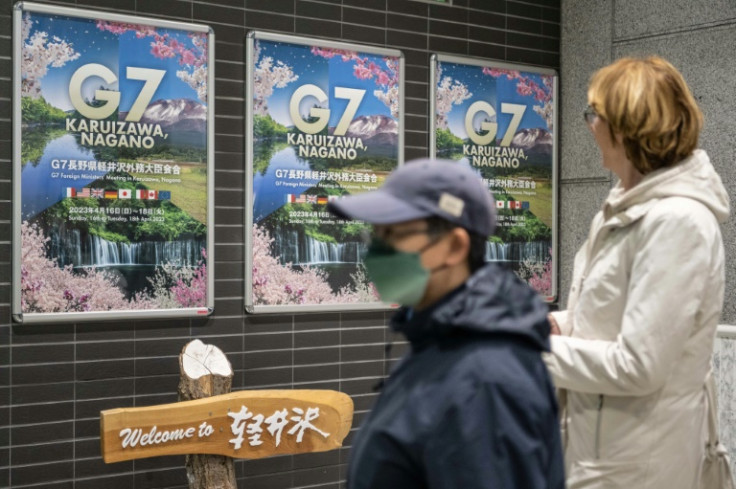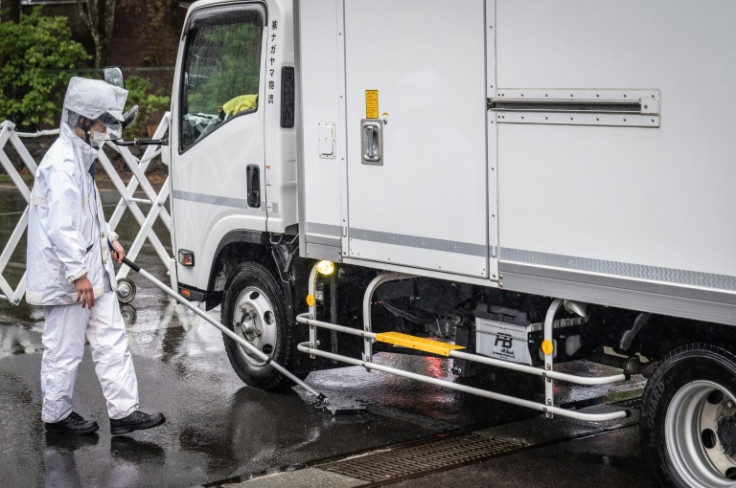China, Ukraine Headline As G7 Foreign Ministers Meet

The G7's top diplomats arrive Sunday in the Japanese resort town of Karuizawa for talks set to be dominated by twin crises: China's growing pressure on Taiwan, and Russia's war in Ukraine.
There will be no shortage of diplomatic and security challenges to discuss, but recent regional events are likely to sharpen the focus on Asia.
The meeting comes days after China concluded major military drills around self-ruled Taiwan, and with Beijing barring ships from an area north of the island on Sunday.
On Thursday, North Korea launched what it said was a new solid-fuel intercontinental ballistic missile, just the latest in a stepped-up barrage of tests that have rattled nerves.
As this year's host, Tokyo is keen to ensure regional challenges are top of the agenda, and will make clear it believes Russia's invasion of Ukraine only heightens the need for vigilance in Asia.
Japan's Prime Minister Fumio Kishida, whose government has revamped defence policy and spending in the face of growing Chinese power, has repeatedly warned "Ukraine today could be East Asia tomorrow".
"Japan's basic position... on Ukraine is that the security of Europe and that of the Indo-Pacific cannot be discussed separately," a Japanese government official said ahead of the talks.
"They are intertwined with each other."
The G7 has regularly warned China against attempts to seize Taiwan, and individual members have sounded the alarm in recent days.
"A military escalation in the Taiwan Strait... would be a horror scenario for the entire world," German Foreign Minister Annalena Baerbock said this Friday in Beijing.
But there will be renewed focus on the grouping's language after recent comments by French President Emmanuel Macron.
His insistence, after a trip to Beijing, that Europe should avoid "crises that aren't ours" has raised eyebrows and ire among Paris's allies, while delighting Chinese officials.
Paris has worked to temper the reaction, insisting France's views have not changed, and most observers expect the group to reiterate previous positions warning China against "changing the status quo by force".
Still, Macron's comments expose a reality for the group -- Japan, the United States, Britain, Canada, France, Italy, Germany and the European Union -- said Paul Nadeau, adjunct professor of political science at Temple University's Japan campus.
"Each member of the G7 still wants a bit of autonomy in the way they pursue their relationship with China," he told AFP.
"They don't want to overcommit, they want to maintain some freedom of manoeuvre."
So while China will be a top priority, consensus will be easier to find for the grouping on Ukraine, with their final statement likely to again demand Russia's immediate withdrawal and pledge continued support for Kyiv.
The bloc has jointly imposed significant sanctions on Russia, with Japan going further than before to join its allies in punishing Moscow for the invasion.
That makes it unlikely the meeting will produce substantive new measures, though promises to support war-crimes prosecution, as well as fresh expressions of concern on nuclear sabre-rattling by Russia are probable.
Both Russia's invasion and growing concerns about China have put renewed focus on the issue of economic security and the urgent need to diversify supply chains for everything from energy to semiconductors.
Tokyo and Washington have warned about the risk of "economic coercion", and G7 ministers are expected to pledge measures to counter attempted supply distortions.
Japan recently joined the Netherlands and United States in announcing export controls for chip equipment, a move seen as targeting China, which has called for a WTO review.
The two-day meeting will also tackle international crises from the Taliban's continuing grip on Afghanistan to the ruling military junta's latest attacks in Myanmar, along with space and cybersecurity and disinformation.
It is seen as setting the stage for the leaders' summit in Hiroshima this May.
Security in Karuizawa, west of Tokyo, will be particularly tight after an explosive was thrown Saturday at a campaign event featuring Kishida, who escaped unharmed.

© Copyright AFP 2024. All rights reserved.




















